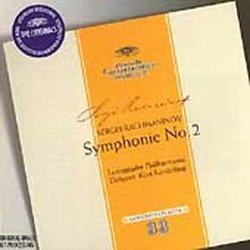| All Artists: Rachmaninoff, Sanderling, Leningrad Po Title: Rachmaninov: Symphony No. 2 / Sanderling, Leningrad Philharmonic Orchestra Members Wishing: 0 Total Copies: 0 Label: Deutsche Grammophon Release Date: 1/27/1998 Genre: Classical Styles: Historical Periods, Modern, 20th, & 21st Century, Symphonies Number of Discs: 1 SwapaCD Credits: 1 UPC: 028944976724 |
Search - Rachmaninoff, Sanderling, Leningrad Po :: Rachmaninov: Symphony No. 2 / Sanderling, Leningrad Philharmonic Orchestra
 | Rachmaninoff, Sanderling, Leningrad Po Rachmaninov: Symphony No. 2 / Sanderling, Leningrad Philharmonic Orchestra Genre: Classical
This powerful, subjective reading, recorded in Berlin in 1956 when Sanderling and the Leningrad Philharmonic were on tour, has long been one of the classics of the catalog. It harks back to a different era both in its expr... more » |
Larger Image |
CD DetailsSynopsis
Amazon.com essential recording This powerful, subjective reading, recorded in Berlin in 1956 when Sanderling and the Leningrad Philharmonic were on tour, has long been one of the classics of the catalog. It harks back to a different era both in its expressive urgency and in the notably flexible manner in which tempo is treated: an era in which passionate, spontaneous, all-out playing was a characteristic of many of the world's greatest musicians, nowhere more than in Russia. Sanderling and the Leningraders impart a high profile to the symphony's many moods, so that the contrast between the gloom of the first movement's introductory Largo and the heart-on-sleeve lyricism that comes later is quite telling. The climaxes are incandescent, but their heat comes less from surface activity than from the pressure of a deep sense of gloom, a fatal undertow, that pervades the entire performance; the connection with Tchaikovsky's "Pathétique" Symphony No. 6 is abundantly clear. Although the sound is monaural, the overall balance and dynamic range are quite impressive. The only drawback is a cut about 10 minutes into the finale that makes the symphony's exultant conclusion seem oddly premature. --Ted Libbey Similar CDs
|
CD ReviewsStunning Anonymous | California USA | 05/17/2000 (5 out of 5 stars) "Being familiar with more modern approaches to this wonderful symphony, I was taken aback the first time I heard this CD. Sanderling, against all expectations, is rampantly expressive with shifts in tempo reminiscent of the great conductor Wilhelm Furtwangler. The result is an unforgettably poignant reading, above all in the crucial first movement. The orchestra is superb (wind and brass seem more under control than usual) and the recording, though mono, is fantastic for its time. I agree with amazon.com's reviewer that the finale is a slight disappointment, both in its unfortunate cut and in a unnecessarily cautious tempo. For this reason you may want to get another more recent version of the symphony (I suggest Pletnev or Ashkenazy) in addition to this one. But in the earlier movements Sanderling offers a unique experience that no Rachmaninov lover should miss!" Orchestral playing of great beauty, fervour and intensity. John Austin | Kangaroo Ground, Australia | 05/20/2001 (5 out of 5 stars) "A great impression was created in the 1950s when a series of DGG recordings appeared. The recordings featured the Leningrad Philharmonic Orchestra and the conductor was Kurt Sanderling. All agreed that the work of an orchestra and conductor in top form had been wondrously well captured on disc. Well, here is one of those famous recordings, the most popular symphony of Rachmaninov, in a successful transfer to CD. You will hear playing of such beauty, fervour and intensity that you might begin to wonder, like me, why Rachmaninov's symphonies have seemed so hard to sit through in actual performance. First time listeners will notice horn and oboe solos played on instruments with an unusual sonority. Also noticeable is the "spot-lighting" of the first violin soloist in the first movement. Don't let these oddities deter you, however. Consult any CD guide and reviewers manual and you'll find this CD either earning a rosette or topping the list." Good, not great rodboomboom | 12/12/2003 (3 out of 5 stars) "I purchased this CD having read rave reviews about the performance. However I was very disappointed. The finale was taken at a slower tempo (Rachmaninoff preferred a faster tempo as mentioned in his biography) and this kills this performance in my opinion. Listen, if you can find it, to the Svetlanov performance with the Bolshoi formerly available on Vox; this performance really catches fire and leaves an unforgettable impression. No one generates the excitement of Svetlanov in this symphony."
|

 Track Listings (4) - Disc #1
Track Listings (4) - Disc #1

